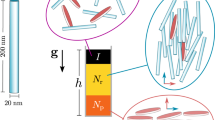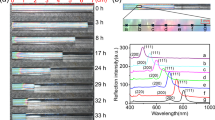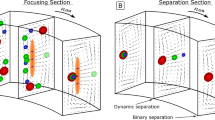Abstract
ELFORD1 has developed a method of particle size determination by centrifuging solutions in inverted capillaries. The sedimentation within the capillaries fulfils Stokes's law, that is, there is a uniform movement of the particles until the boundary approaches the lower open end of the capillary. At this point the boundary comes in contact with disturbing effects such as vibrations and heat convection currents in the outer fluid. These effects tend to reduce the true rate of sedimentation.
This is a preview of subscription content, access via your institution
Access options
Subscribe to this journal
Receive 51 print issues and online access
$199.00 per year
only $3.90 per issue
Buy this article
- Purchase on Springer Link
- Instant access to full article PDF
Prices may be subject to local taxes which are calculated during checkout
Similar content being viewed by others
References
"Handbuch der Virusforschung". Erste Hälfte. Doerr und Hallauer . Wien, Julius Springer, p. 195 (1938).
Author information
Authors and Affiliations
Rights and permissions
About this article
Cite this article
POLSON, A. A New Capillary Cell for Measuring the Rate of Sedimentation of Virus Particles in a Centrifugal Field. Nature 148, 593–594 (1941). https://doi.org/10.1038/148593b0
Issue Date:
DOI: https://doi.org/10.1038/148593b0
Comments
By submitting a comment you agree to abide by our Terms and Community Guidelines. If you find something abusive or that does not comply with our terms or guidelines please flag it as inappropriate.



